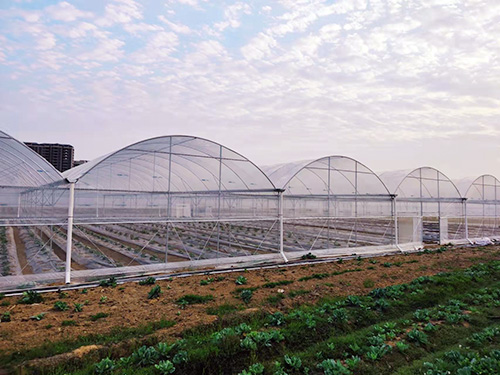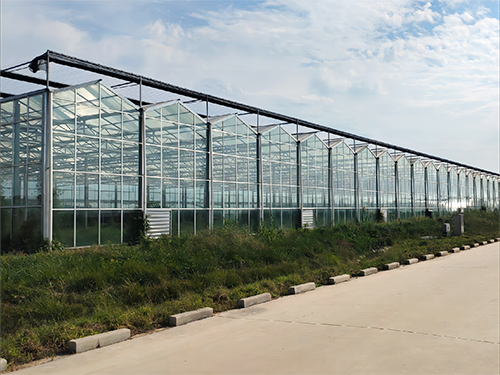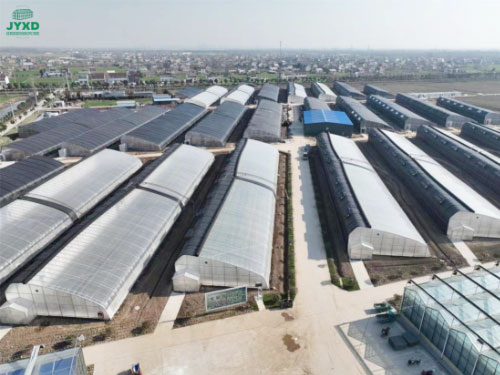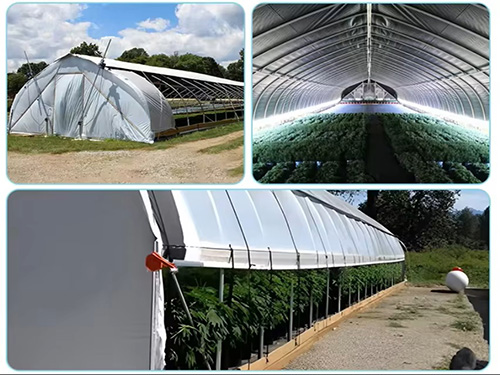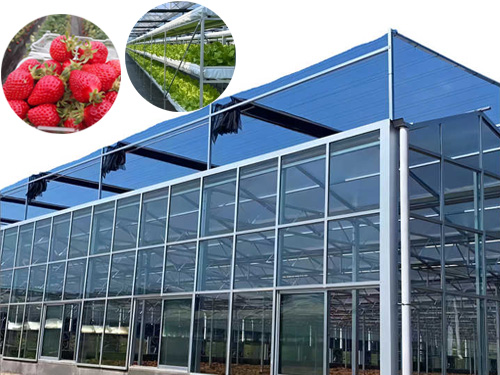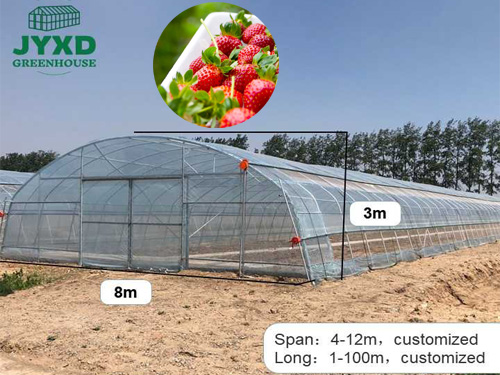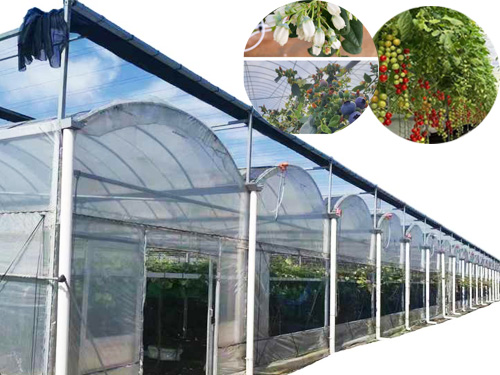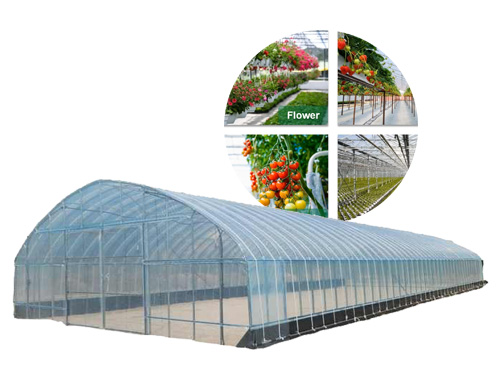NEWS DETAILS
NEWS INFORMATION
Greenhouses for Agricultural Zones: Supporting Large-Scale Farming and Market Demand
AUTHOR:jyxd-greenhouse DATE:2025-03-24 11:17:21 HITS:96
In agricultural zones across the globe, large-scale farming plays a pivotal role in meeting the ever-growing demand for fresh produce. With global populations on the rise and consumer preferences shifting towards locally grown, high-quality crops, greenhouses have become an indispensable tool for enhancing agricultural productivity. Greenhouses provide a controlled environment where crops can be grown efficiently, allowing for year-round production, better yield, and more consistent quality. In this article, we will explore how greenhouses can support large-scale farming in agricultural zones and help meet market demand effectively.
1. The Role of Greenhouses in Large-Scale Farming
Greenhouses are integral to modern farming, especially in agricultural zones where space, climate, and market demand dictate production strategies. They provide a regulated environment that can be adjusted to optimize growing conditions, thus boosting productivity and protecting crops from external challenges such as extreme weather and pests. Here are several ways greenhouses support large-scale farming:
Enhanced Crop Yield and Productivity
One of the primary advantages of using greenhouses in agricultural zones is their ability to maximize crop yield. By controlling factors like temperature, humidity, light, and CO2 levels, greenhouses create an optimal environment for plant growth. This results in faster growth, fewer crop failures, and higher overall yields compared to open-field farming. Greenhouses also enable more intensive farming practices, making it possible to grow crops in a smaller area while maintaining high productivity levels. This is particularly important for agricultural zones with limited space or high land costs.
Extended Growing Seasons
Agricultural zones in regions with harsh climates or short growing seasons can greatly benefit from the use of greenhouses. By providing a stable, controlled environment, greenhouses extend the growing season beyond the limitations of local weather patterns. This allows farmers to cultivate crops throughout the year, meeting market demand during both peak and off-seasons. With the ability to grow crops in winter or cooler months, greenhouse farming ensures a steady supply of fresh produce, benefiting both local and international markets.
Protection from Pests and Diseases
Greenhouses serve as protective barriers for crops, shielding them from harmful pests and diseases that might otherwise damage plants. This protection reduces the need for harmful pesticides and chemicals, promoting more sustainable farming practices. In large-scale farming operations, minimizing the use of pesticides not only improves crop health but also results in safer produce for consumers. Moreover, with fewer pests and diseases, crops can thrive with minimal interference, improving both yield and quality.
2. Advanced Technologies in Greenhouse Farming
The integration of cutting-edge technologies into greenhouse farming has revolutionized how crops are cultivated in agricultural zones. By adopting these technologies, large-scale farms can improve efficiency, reduce costs, and increase overall production. Here are some of the most impactful technologies being used in greenhouse farming:
Climate Control Systems
Automated climate control systems are essential for managing temperature, humidity, light levels, and CO2 concentrations within a greenhouse. These systems enable farmers to maintain a consistent growing environment regardless of external weather conditions. In agricultural zones where weather can fluctuate, climate control systems ensure that crops receive optimal conditions for growth, ultimately increasing productivity. Additionally, these systems can be automated, reducing the need for manual monitoring and labor.
Hydroponics and Aquaponics
Hydroponics and aquaponics are innovative soilless farming methods that are becoming increasingly popular in greenhouse environments. These systems allow plants to grow in nutrient-rich water rather than soil, improving water efficiency and reducing the risk of soilborne diseases. Hydroponic systems, in particular, are well-suited for large-scale farming as they can support high-density planting, leading to greater crop yields per square meter. Aquaponics, which combines fish farming with plant cultivation, offers a sustainable farming solution by using fish waste to fertilize plants, creating a closed-loop ecosystem.
LED Lighting
LED grow lights have become a staple in modern greenhouse farming, particularly in agricultural zones where natural sunlight may not be consistent year-round. These lights provide the specific light spectrum that plants need to photosynthesize effectively. By using LED lighting, farmers can extend the growing day, accelerate plant growth, and increase overall yield. Furthermore, LED lights are energy-efficient, which helps reduce the overall operational costs of running a greenhouse.
3. Meeting Market Demand through Greenhouse Farming
As consumer preferences for fresh, locally grown produce continue to rise, greenhouses in agricultural zones offer an effective way to meet the growing market demand. Here’s how greenhouses help farmers stay competitive in the marketplace:
Consistent Supply of High-Quality Produce
Greenhouses allow for precise control over environmental factors, ensuring that crops are grown under ideal conditions. This consistency results in high-quality produce that meets the expectations of both local and international markets. With year-round production, greenhouse farmers can supply fresh crops consistently, even during off-seasons when open-field farming might not be feasible. This consistent supply makes it easier to build long-term relationships with distributors, retailers, and consumers.
Diversification of Crops
Greenhouses enable farmers to grow a variety of crops that may not be viable in traditional outdoor farming systems. Specialty crops, such as herbs, exotic fruits, and off-season vegetables, thrive in greenhouse environments, allowing farmers to tap into niche markets. By diversifying their offerings, greenhouse operators can expand their market reach and command higher prices for specialty produce. Agricultural zones that incorporate greenhouse farming can meet the diverse needs of consumers and capitalize on emerging food trends.
Global Market Access
Greenhouses play a crucial role in enabling agricultural zones to supply fresh produce to global markets. Many international buyers demand high-quality, safe, and consistent products, and greenhouse farming meets these criteria. Crops grown in greenhouses are less susceptible to contamination from pests and diseases, ensuring that they adhere to strict food safety standards. Furthermore, the ability to produce crops year-round gives greenhouse farmers a competitive edge in the global market, where demand for fresh produce is constant.
4. Sustainability in Greenhouse Farming
Sustainable farming practices are increasingly important in meeting market demand while minimizing environmental impact. Greenhouses offer a range of eco-friendly benefits, helping farmers in agricultural zones adopt more sustainable practices.
Water Conservation
Water is a limited resource, and greenhouse farming is one of the most water-efficient methods of crop cultivation. Closed-loop irrigation systems, such as drip irrigation, ensure that water is delivered directly to plant roots, minimizing water wastage. Additionally, rainwater harvesting systems can be used to collect and store water for future use, reducing reliance on external water sources. These water-saving technologies make greenhouse farming an ideal choice for agricultural zones facing water scarcity.
Energy Efficiency
Energy consumption is a significant factor in greenhouse farming. However, advancements in energy-efficient technologies, such as solar panels, geothermal heating systems, and energy-efficient LED lighting, have helped reduce the environmental footprint of greenhouse operations. These systems allow greenhouse farms to operate more sustainably while maintaining high levels of productivity. Additionally, passive design strategies, such as proper insulation and ventilation, can help regulate temperatures without relying heavily on external energy sources.
Waste Reduction
Greenhouse farming generates less waste compared to traditional farming methods. Organic waste, such as plant debris and crop residues, can be composted and used to enrich the soil or create new growing mediums. Furthermore, greenhouse materials such as plastic trays and pots can be recycled or repurposed, reducing the amount of waste sent to landfills. By incorporating these sustainable practices, greenhouse farming helps reduce environmental impact while maintaining profitability.
5. Conclusion
Greenhouses are essential tools for supporting large-scale farming in agricultural zones, offering numerous benefits such as increased crop yield, extended growing seasons, and improved crop protection. Through the integration of advanced technologies and sustainable practices, greenhouse farming enhances productivity, reduces environmental impact, and meets the growing market demand for fresh, high-quality produce. As agricultural zones continue to evolve, greenhouses will remain a key component of successful farming strategies, enabling farmers to meet both local and international demands for fresh food year-round.
Hebei Juyou Xinda Greenhouse Facilities Co.,Ltd.
Copyright © 2024-2025 https://www.jyxd-greenhouse.com. All Rights Reserved Hebei Juyou Xinda Greenhouse Facilities Co.,Ltd.Copyright




 Current Location:
Current Location: